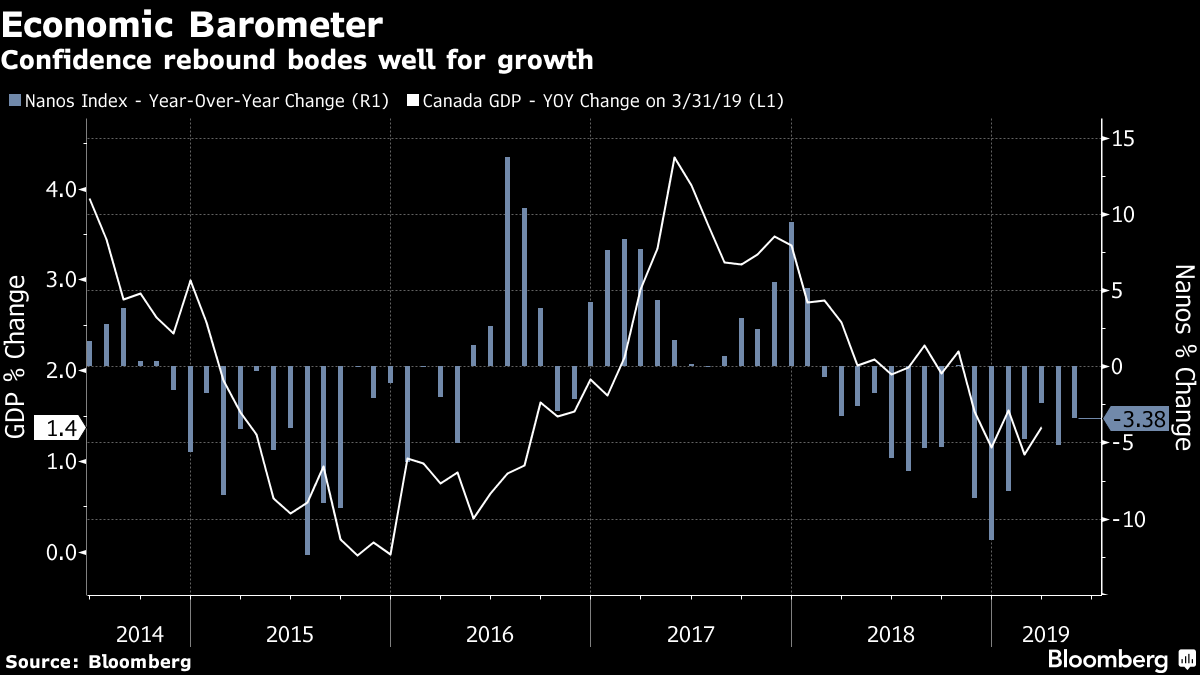Jun 3, 2019
Canadians less gloomy about economy after Trump lifts tariffs
, Bloomberg News
Canadians less pessimistic on economy after Trump's metals tariffs lifted
Canadians became less pessimistic about the economic outlook last month, telephone polling suggests, after the U.S. lifted tariffs on the nation’s steel and aluminum.
The share of respondents who see the economy weakening over the next six months fell to 30 per cent at the end of May, down from 36 per cent a month earlier, according to surveys by Nanos Research Group for Bloomberg News shows. Those who see it strengthening rose to 16 per cent, from about 13 per cent at the end of April.
It’s a positive sign for the economy, at a time of otherwise high anxiety for the nation’s households. Consumer sentiment -- a good barometer of growth -- has been at depressed levels for more than a year, suggesting dim prospects for a sustained rebound.
While economic pessimists typically outnumber optimists, the difference between the two groups continues to be higher than the historical average. That said, the gap narrowed last month to the least since November.

Trade Deal
The improvement probably reflects the impact of President Donald Trump’s decision to lift metals tariffs on Canada, a move that’s expected to help clear a path toward ratification of a new North American trade deal. However, the polling was undertaken before Trump’s unexpected vow late last week to combat illegal immigration by imposing escalating tariffs on all Mexican goods.
Every week, Nanos Research asks 250 Canadians for their views on personal finances, job security, the outlook for the economy and where real estate prices are headed. Bloomberg publishes four-week rolling averages of the 1,000 telephone responses.
The Bloomberg Nanos Canadian Confidence Index -- a composite indicator calculated from the rolling averages of the four questions -- ended May at 55.5, up from 54.9 at the end of April. While that’s the highest end-of-month reading in 2019, the confidence index has remained close to current levels for most of this year, after plunging in 2018.
Canada’s economy is undergoing one of its most sluggish periods in the past decade with growth at a near halt, weighed down by last year’s sharp decline in oil prices and growing global trade tensions that have curtailed business investment. Home owners have also been rattled by a slowdown in real estate markets, particularly Vancouver and Toronto.
- 'It's about time' metals tariffs lifted, Martinrea chairman says
- Canadian retaliatory tariffs lifted as U.S. kills steel, aluminum penalties
- Stelco has ‘whole bunch’ of M&A targets as steel tariffs end, executive chairman says
READ MORE: METALS TARIFFS LIFTED
The survey shows that in addition to waning pessimism about the economy, Canadians are more optimistic about the prospects for real estate, with just over 40% expecting prices to rise over the next six months, the highest reading this year.
Better numbers for the economic outlook and real estate were offset by worsening scores on job security, the data found.
Regionally, households in Quebec remain the most optimistic while those in Alberta and other prairie provinces report the most pessimism.
--With assistance from Erik Hertzberg



